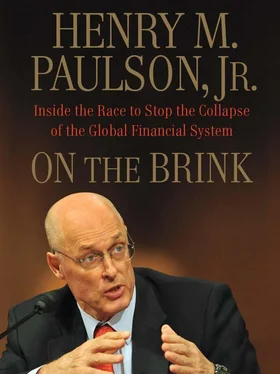There are different ways to build relationships. It helps to socialize, but I liked to sell substance. I had a very direct approach that clients needed time to get used to. I wanted people to feel they’d learned something from me each time we met. I advised my clients on all kinds of things that, strictly speaking, had nothing to do with investment banking: from help with business strategies to advice on foreign competition and even insights on the quality of their executives. It was the beginning of the era of hostile takeovers and leveraged buyouts, and we advised many companies in the 1980s on how to defend themselves from unwanted overtures.
Long hours at the office can cause problems at home, and this was a period of great stress in my marriage. I’d come home too tired to want to do much with the children when they were very young. We couldn’t afford to finish our bedroom, so we were living in an open loft, with the kids in rooms right next to us. I sometimes locked myself in the bathroom with Sports Illustrated to relax in quiet. Wendy made it clear I had to help out and get home earlier to give the kids baths, read a story, and put them to bed.
With Gorter’s support, I began a pattern where I’d leave the office at 4:30 p.m., run for the 4:42 p.m. train, and be home at 5:25 p.m. After supper, I’d read to the kids. I had them trained so I could zip through a bedtime story very quickly. One night Wendy came in and urged, “Slow down and read with expression.” I tried, but as soon as I did, both kids started crying: “No, no! Read like a daddy, not like a mommy.” Once they were asleep, I’d get on the phone and start talking to clients, who’d say, “Good Lord, you’re still in the office working?”
When I tell this story about work-life balance, people say: “Paulson, you SOB, you worked people harder than anybody at Goldman Sachs.” Fair enough. But I always told folks at Goldman: It’s not your boss’s job to figure out your life. You spend so much time planning your work schedule and your career, you need to make that kind of effort to manage your private life, too. Learn how to say no. Remember, you are not going to get ahead, in any case, being a grunt.
These days, Amanda is the Midwestern bureau chief for the Christian Science Monitor in Chicago, and she and her husband, Josh, have two children. Merritt owns and runs the Portland Beavers Triple-A baseball team and the Portland Timbers soccer team. He and his wife, Heather, have a daughter.
Over the years I developed an interest in management. When Gorter moved up to run investment banking for Goldman, he prodded me to take over the Midwestern region. I chaired a couple of strategic planning committees, and in 1990, when John Weinberg retired as head of the firm, his successors, Steve Friedman and Bob Rubin, picked me to run investment banking with Bob Hurst and Mike Overlock. I was also asked to put together a strategy for growing our private-equity business and to oversee it. We had also decided to expand in Asia, and my New York colleagues said to me: “Chicago is closer to Asia than New York. Why don’t you take that?”
I welcomed the challenge. Asia, and China in particular, was on the verge of the incredible boom we have seen in recent years, but we did almost nothing on the mainland then. My first meeting with China’s senior leaders came in 1992, when Tung Chee-hwa, who was then running his own company and later became chief executive of the Hong Kong Special Administrative Region, took me to meet President Jiang Zemin. We were talking about economic reform, and Jiang told me that he had been reading about the U.S. economy, ticking off the names of companies he knew, like General Electric, Boeing, and IBM. Then he looked me right in the eye and said, “Assets equal liabilities plus equity.”
I’m not sure that our country’s leaders could have summed up a balance sheet as succinctly as this born-and-bred Communist. I flew back and told Rubin and Friedman that there was a huge opportunity in China and that I thought we should expand aggressively. From having virtually no presence there at all in 1992, we went to having perhaps 1,500 people in the country when I left Goldman in 2006. In that time I made about 70 trips to China.
The effort paid off in many ways—including some I couldn’t have imagined before. It made Goldman the leading banking adviser in the world’s fastest-growing economy, and it gave me a range of close relationships and contacts with the most senior Chinese leaders. These would help us enormously when I was at Treasury, especially during the financial crisis. Because of the high-profile nature of the work—generally privatizations of state-owned companies—I got very involved in our early efforts. These deals required a terrific amount of strategic and technical work as we prepared China’s often bloated and creaky state-run companies for the demands of Western investors, who expected world-class business operations and sound corporate governance. The Chinese, for their part, were eager to adopt the best practices from the West.
During this time Goldman was growing rapidly all over the world and prospering handsomely. But we also had two big scares that made me reexamine my views on risk. Both episodes led me to take a greater role in the management of the firm.
The first came in 1994, when Goldman had a very difficult year, with big trading problems. The firm lost more than a hundred million dollars every month for a number of months. Our capital structure was also a big problem. When partners left, they took half of their money and left the rest in the firm, earning interest on it. That year, spooked by the trading losses, far more partners than usual decided to leave and “go limited,” putting our capital under great strain. As long as we could keep the partners, the firm’s viability was never in question. Even though the size of our balance sheet had grown dramatically, Goldman’s leadership had always understood that if you were relying on wholesale funding, like an investment bank does, you had better have great amounts of excess liquidity—in layman’s terms, more than enough cash on hand at all times to pay off any immediate demands from creditors.
Complicating matters, Steve Friedman, a mentor and friend who had been running the firm alone—Bob Rubin had joined the Clinton administration—decided to retire in September because of concerns about his health. Jon Corzine was named chairman, with me as vice chairman and chief operating officer. Out of our near disaster, we set up new oversight committees and installed far better systems, processes, and controls for managing risk.
The next scare came in 1998. That spring the partners voted to become a public company. A number of investment banks were making big bets on Russia, which defaulted. As these firms lost money, they raced to raise cash. They couldn’t sell their Russian holdings, which had become worthless, so they started selling other investments, like mortgage securities, which drove down their value.
Even if you had a conservatively managed mortgage business, as Goldman did, you lost heavily. The markets began to seize up, and securities that had been very liquid suddenly became illiquid. The biggest victim of this was the hedge fund Long-Term Capital Management, whose failure, it was feared, might lead to a broad collapse of the markets. The investment banking industry, prodded by the Federal Reserve, banded together to bail out LTCM, but the pain was broader. I remember watching some of our competitors struggling for survival because they had relied on short-term funding that they couldn’t roll over. Goldman made money—I think we ended up earning 12 percent on capital for the year—but we were hemorrhaging for a month or two, and it was frightening. We had to postpone our initial public offering, which had been scheduled for the fall.
Читать дальше












